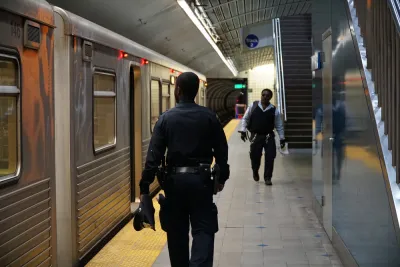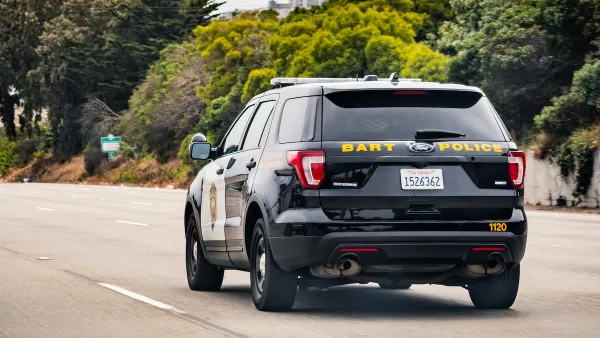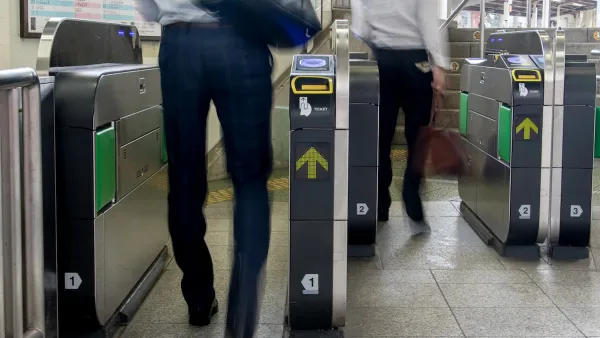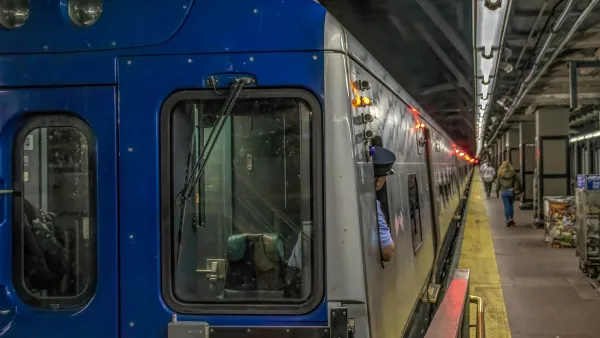Some transit agencies are launching ‘ambassador’ programs that use unarmed personnel to respond to safety concerns and reduce interactions with armed law enforcement.

Advocates have long called for a decrease in armed police presence on public transit, citing research showing that a police presence doesn’t necessarily contribute to a safer environment and discourages ridership. Now, transit agencies are starting to shift their approach when it comes to transit security, writes Henry Pan in Next City.
“Last year, BART Police began to pilot its Transit Ambassadors program, using uniformed but unarmed personnel to respond to riders facing homelessness, mental health emergencies, drug overdoses and other crises.” For now, these ambassadors are still accompanied by police officers, but BART’s Chief Communications Officer Alicia Trost says “The idea is to really reimagine safety and to meet the needs of all types of riders, but especially marginalized communities who are often not listened to, or or often aren’t given resources based on their needs.”
According to Pan, “Deploying ambassadors seems to be working. During the pilot period between February and August of 2020, ambassadors called police to resolve less than 1% of the over 14,000 interactions they have with riders. Reports on sexual harassment, sexual assault and lewd behavior sent by riders through their BART Watch app are also decreasing, from 2% in 2019 to less than 1% so far this year.”
Similarly, “The Massachusetts Bay Transportation Authority has an ambassador program that relies on contractors, with the Los Angeles County Metropolitan Transportation Authority to follow next month. Metro Transit’s Police Department in the Twin Cities created a Homeless Action Team in 2018 that connected over 400 formerly unhoused people who ride the system for shelter to public housing managed by its parent agency, the Metropolitan Council.”
For now, BART plans to stick with police officers alongside the new ambassadors, citing the potential need for an armed response in the event of a major incident.
FULL STORY: Transit Agencies Try Decarceral Approaches to Improve Rider Safety

Analysis: Cybertruck Fatality Rate Far Exceeds That of Ford Pinto
The Tesla Cybertruck was recalled seven times last year.

National Parks Layoffs Will Cause Communities to Lose Billions
Thousands of essential park workers were laid off this week, just before the busy spring break season.

Retro-silient?: America’s First “Eco-burb,” The Woodlands Turns 50
A master-planned community north of Houston offers lessons on green infrastructure and resilient design, but falls short of its founder’s lofty affordability and walkability goals.

Test News Post 1
This is a summary

Analysis: Cybertruck Fatality Rate Far Exceeds That of Ford Pinto
The Tesla Cybertruck was recalled seven times last year.

Test News Headline 46
Test for the image on the front page.
Urban Design for Planners 1: Software Tools
This six-course series explores essential urban design concepts using open source software and equips planners with the tools they need to participate fully in the urban design process.
Planning for Universal Design
Learn the tools for implementing Universal Design in planning regulations.
EMC Planning Group, Inc.
Planetizen
Planetizen
Mpact (formerly Rail~Volution)
Great Falls Development Authority, Inc.
HUDs Office of Policy Development and Research
NYU Wagner Graduate School of Public Service




























